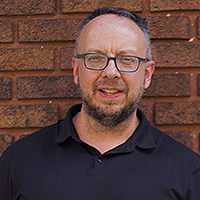by Stephen Kriss, Executive Minister
It’s been four years since the beginning of the COVID-19 pandemic; ¿Qué onda? (Spanish for “what’s the wave?” or “what’s up?”).
Last Sunday, I sat in the living room of Josué and Nohemi Gonzalez’s home in Pembroke Pines, Florida for the worship gathering of Resplandece Mennonite Church. Resplandece is one of the half-dozen new congregations that have emerged with connections to Mosaic in the last year. And it is one of three Mosaic communities that meet mainly through Zoom This Sunday, the worship was moderated from Florida by Josué and the sermon and music-leading from Barranquilla, Colombia by church-planting pastor Manuel García Noriega and his family.
Admittedly, I was skeptical of this model. I have been skeptical about Zoom worship since the first time I preached with Wellspring Church of Skippack (PA) from my front porch at the beginning of the pandemic. I was frustrated with the seemingly disembodied reality of Zoom worship and technological glitches. However, even that Sunday, while I focused on what was lacking, the worship moderator, Eloise Meneses, made sure that everyone was seen, heard, and acknowledged. In the isolation of the pandemic, that was the most important thing. The good news was less about my sermon and more about the community, gathered in the way that we could, in a time of confusion and disconnection.
Four years later, we are using this technology differently, and it is changing us. Several of our worshipping communities offer hybrid worship and many more stream their services online. Bible studies and meetings are on Zoom. The work of the church continues with technology, and we are navigating how to be church differently.
Resplandece highlights something else for us: Human migration is also transforming Mosaic. Those who gather online are scattered from Colombia to New York City, and most are from Colombia or Venezuela. We have added Spanish-speaking staff to keep up with the rapid growth of the Spanish-speaking community in our midst. New Russian-speaking and Haitian communities have also emerged.
In Philadelphia, which is also a center for our growth, some immigrant communities have almost doubled in size since 2020. We have three Spanish-speaking communities in Philadelphia led by pastors from the Dominican Republic, Central America, and Mexico. Migration will continue to shape Mosaic as it has since our beginning as a Conference 300 years ago when the first families arrived in Pennsylvania from Europe.
The third thing shaping Mosaic is the political landscape. We are in an election year, like we were in the onset of the pandemic. However, it is not only U.S. political realities that challenge us. The elections in Indonesia last week deeply affect the 10% of Mosaic with roots there. The sociopolitical collapses in Venezuela and Haiti also shape us as persons flee those countries under new U.S. visa policies. The war in Ukraine and the recent death of Russian opposition leader Alexander Navalny impact our communities too. We have always been shaped by political climates, and we must remain focused on our Jesus-centered faith despite political differences.
Changes in technology, human migration, and global and local politics are not new. Our Anabaptist movement was spurred on by the printing press that made Bibles accessible, by migration in Europe and into the Western Hemisphere, and by the politics of the time. Though they may appear as threats, they are “waves” we have navigated in the past and will continue to experience. Ignoring them is not an option.
We don’t always need to agree on the best responses to these challenges to live faithfully and vibrantly into the future. We have a history of learning to ride the waves. And Jesus, who demonstrated how it is possible to even walk on water, and who can calm the storms around us and within us, is always still with us.

Stephen Kriss
Stephen Kriss is the Executive Minister of Mosaic Mennonite Conference.
The opinions expressed in articles posted on Mosaic’s website are those of the author and may not reflect the official policy of Mosaic Conference. Mosaic is a large conference, crossing ethnicities, geographies, generations, theologies, and politics. Each person can only speak for themselves; no one can represent “the conference.” May God give us the grace to hear what the Spirit is speaking to us through people with whom we disagree and the humility and courage to love one another even when those disagreements can’t be bridged.
